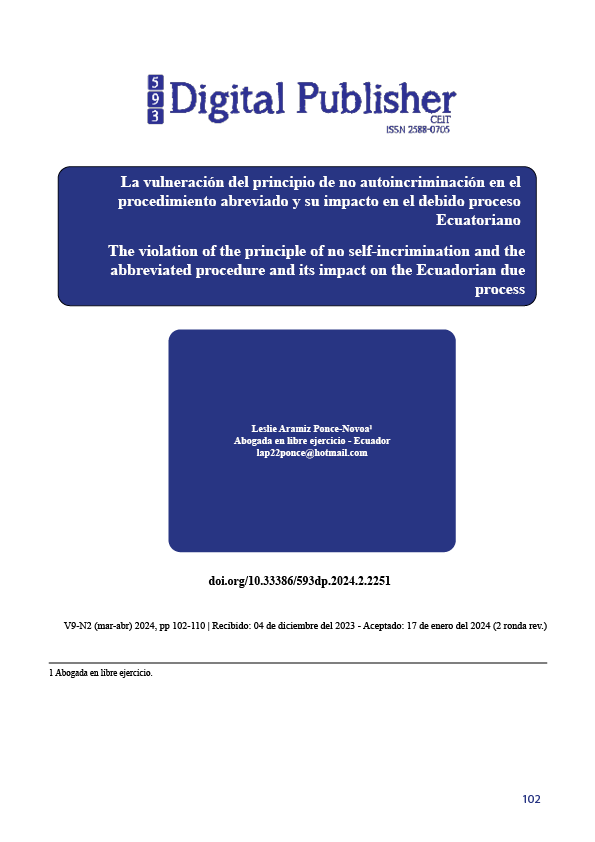The violation of the principle of no self-incrimination and the abbreviated procedure and its impact on the Ecuadorian due process
Main Article Content
Abstract
This scientific article focuses on the vulnerability of the principle of non-self-incrimination in Ecuadorian abbreviated proceedings and the consequent influence on due process. Concerns about the coercion and pressure exerted on defendants to obtain self-incriminating statements, the lack of adequate legal advice, and the lack of understanding of the legal consequences of abbreviated procedures are highlighted in an analysis of real cases. The results highlight the need for legal and practical reforms that provide greater protection of the fundamental rights of the accused and seek a balance between procedural efficiency and fairness in Ecuador's judicial system. Finally, the importance of a more equitable and rights-respecting legal system in which the principle of non-self-incrimination is fully implemented is emphasized in order to preserve the integrity of due process in Ecuador.
Downloads
Article Details

This work is licensed under a Creative Commons Attribution-NonCommercial-ShareAlike 4.0 International License.
1. Derechos de autor
Las obras que se publican en 593 Digital Publisher CEIT están sujetas a los siguientes términos:
1.1. 593 Digital Publisher CEIT, conserva los derechos patrimoniales (copyright) de las obras publicadas, favorece y permite la reutilización de las mismas bajo la licencia Licencia Creative Commons 4.0 de Reconocimiento-NoComercial-CompartirIgual 4.0, por lo cual se pueden copiar, usar, difundir, transmitir y exponer públicamente, siempre que:
1.1.a. Se cite la autoría y fuente original de su publicación (revista, editorial, URL).
1.1.b. No se usen para fines comerciales u onerosos.
1.1.c. Se mencione la existencia y especificaciones de esta licencia de uso.
References
Asamblea Constituyente. (2008). Constitución de la República del Ecuador. Montecristi: Gobierno del Ecuador. Montecristi.
Bonifaz, V. (2022). Compatibilidad Normativa entre el Procedimiento Abreviado y el Debido Proceso Constitucional en el Derecho Penal Ecuatoriano. Otavalo: Universidad de Otavalo.
Chango, N. (2016). Análisis del debido proceso con la vigencia del Código Orgánico Integral Penal en los Procedimientos Directos. Quito: Universidad Central de Ecuador.
Código de la Niñez y Adolecencia. (2017). Quito: Editorial Jurídica del Ecuador .
Corte Constitucional del Ecuador , 0261-09-EP (Sentencia N.o 035-10-SEP-CC 06 de Octubre de 2010).
Criollo, C., Mogrovejo, R., & Durán, A. (2019). Observancia del tratamiento jurídico penal a las personas con trastornos mentales comprobados en el COIP. Conrado, 15(68), 203-213.
Gallardo, M. (2013). Sujeto, Familia y Sociedad: Reflexión Sobre la Delincuencia Juvenil. Cali: Universidad de San Buenaventura Cali.
Guerrero, B., & Zamora, A. (2020). El procedimiento abreviado frente a la prohibición de autoincriminación. Polo del Conocimiento, 5(8), 175-194.
Guerrero, E. (2015). Transformaciones judiciales en el Ecuador: El equilibrio de poderes visto a través del análisis de redes sociales. Ius Humani: Revista de Derecho(4), 263-297.
La Hora. (5 de Junio de 2011). La delincuencia enrola a menores. La Hora.
La República. (20 de Abril de 2023). La República. Obtenido de Niños y adolescentes cometen muertes violentas desde los 11 años en Ecuador: https://www.larepublica.ec/blog/2023/04/20/ninos-y-adolescentes-cometen-muertes-violentas-desde-los-11-anos-en-ecuador/#:~:text=Los%20niños%20y%20adolescentes%20cometen,enero%20y%20marzo%20de%202023.
Maturana, C., & Montero, R. (2017). Derecho Procesal Penal. Santiago: Editorial Librotecnia.
Ministerio de Gobierno. (2000). Código de Procedimiento Penal 2000. Quito: Ministerio de Gobierno.
Miño, J. (2016). La delicuencia en la sociedad Ecuatoriana. Revista de Ciencias de Seguridad y Defensa , 41-44.
Organización de los Estados Americanos. (1969). Convención Interamericana de Derechos Humano. New Yotk: ONU.
Quispe, F. (2017). El derecho a la no incriminación y su aplicación en el Perú. Rev. Sis Bib, 1-23.
Reyes, J. (2016). Imputabilida e inimputabilidad. Ciudad de Panamá: Seguridad y Defensa.


